
Latest News Regarding
Horn of Africa
EU mission against piracy commanded by Portugal until Decembe
EU mission against piracy commanded by Portugal until December
Source: Macau Business
By LUSA
Saturday August 6, 2022

Commodore Marcelo Correia will command the European Union’s Operation Atalanta until December, a naval force which aims to prevent piracy and trafficking in the Somali Basin and has seized about 12 tonnes of drugs since March.
In the 41st rotation of Operation Atalanta, which ends on 2 December, six Portuguese Navy personnel were involved, including Commodore Marcelo Correia, who took command of the mission on Thursday.
In total, the force is composed of 18 soldiers from eight nationalities: Portugal, Spain, Italy, Serbia and Monte Negro, Republic of Korea, Colombia and Djibouti, “with the participation of the latter three resulting from bilateral agreements with the European Union,” said Commodore Marcelo Correia.
Speaking to Lusa, Correia said that the main objectives of “operation Atalanta are the deterrence, prevention and repression of acts of piracy in the Gulf of Aden and the Somali Basin,” also contributing “to the increase of maritime security in the region through tasks of monitoring drug trafficking, arms, illegal, unreported and unregulated fishing, and illicit trade in coal.
Since February, he added, there is also the possibility of conducting operations to combat drug trafficking, “with the seizure of about 12 tonnes of narcotics since March this year being noteworthy.”
“No piracy attacks have been recorded since 2019, and this is a clear sign of the effectiveness of the ATALANTA operation, the other forces present in the region and the protection measures adopted by merchant shipping,” he considered.
Another of the objectives of this EU mission is the protection of the ships of the ‘World Food Programme’ [World Food Programme], a humanitarian aid organisation of the United Nations, founded in 1961 and financed through voluntary contributions from governments, institutions, corporations or individual citizens.
“Protection of WFP-chartered vessels can be done in three ways, depending on the vulnerability assessment of each vessel. This can be done by simply monitoring the movements of the ship, a close escort or the boarding of a security team that can integrate the operation for this purpose,” he detailed.
Asked about the main difficulties he anticipates in the coming months at sea, the commodore mentioned the size of the area, “which represents almost twice the area of the EU countries”, the pandemic of covid-19, “requiring permanent measures to mitigate the risk of contagion” or the “volatility and fragility of the security situation in the region, associated with the drought that is being felt in Somalia and the consequent lack of food” which “could promote the resurgence of acts of piracy”.
He also stressed, “the potential impact that the war in Ukraine could have, especially with the possible increase in maritime traffic in the region”, warning that a “false perception of the total eradication of piracy could lead to a reduction in the adoption of protective measures by merchant shipping, increasing its vulnerability”.
The force currently consists of the Spanish frigate Numancia, the flagship, the Italian frigate Fasan and an airborne detachment with a Spanish maritime patrol aircraft operating from Djibouti, the Portuguese commodore said, adding that “at the end of this month, a Spanish special operations task force will join the force.
Somalia reiterates Taiwan as an inalienable part of China’s territory
Somalia reiterates Taiwan as an inalienable part of China’s territory

Source: Hiiraan Online, Saturday August 6, 2022
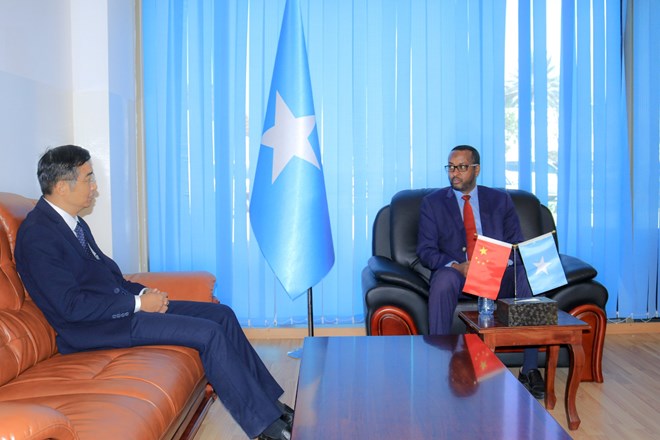
Mogadishu (HOL) – Somali government reiterated its unwavering support for China’s sovereignty, political independence, territorial integrity and national unity.
The Ministry of Foreign Affairs of Somalia calls for adherence to relevant United Nations and African Union resolutions.
Federal Government of Somalia declares its full solidarity with the People’s Republic of China in defending its sovereignty and territorial integrity while affirming its firm position to respect the one-China policy, considering Taiwan an inalienable part of China’s territory,” the ministry said in a statement on Saturday.
The statement was issued by the outgoing Ministry of Foreign Affairs staff. The federal parliament has not yet confirmed Somalia’s new cabinet, which Prime Minister Hamza Barre nominated earlier this week.
The ministry added that Somalia has long-standing relations with China, where cooperation between the two friendly countries is distinguished in the political, economic and development fields of common benefit and the joint coordination of positions in regional and international forums.
Taiwan has forged close relations with Somaliland, another independent but unrecognized nation seeking independence from Somalia. In February 2022, a high-profile delegation travelled from Hargeisa to Taipei after establishing embassies in 2020 in each other’s territory 2020.
Somalia’s federal government has publicly rebuked Taiwan in the past for interfering in Somalia’s internal affairs and violating its sovereignty. The Somali government declared an oil deal between Somaliland and Taiwan in February 2022 null and void.
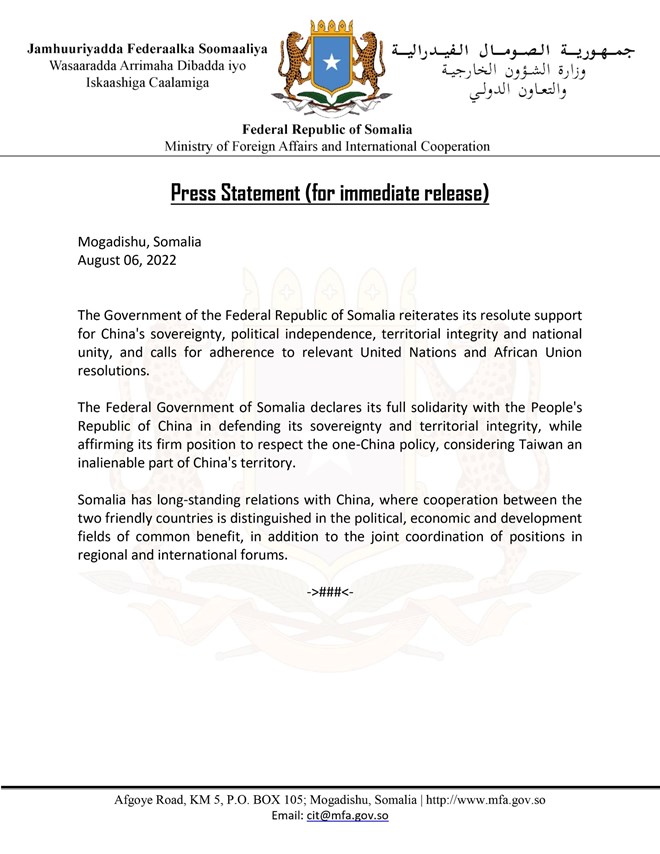
Somalia’s Prime Minister appoints 26-member Cabinet
Somalia’s Prime Minister appoints 26-member Cabinet

Source: Hiiraan Online, Tuesday August 2, 2022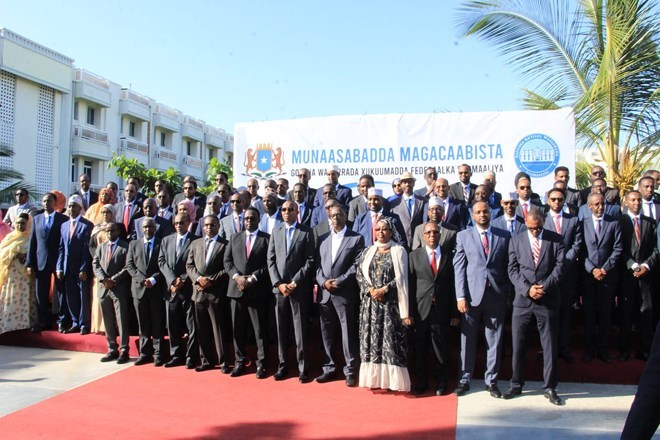
Mogadishu (HOL) – Somali Prime Minister Hamza Abdi Barre unveiled his Council of Ministers on Tuesday, which included Al-Shabab’s former deputy leader Mukhtar Robow Ali Abu Mansoor as the Minister of Religious Affairs and Senator Salah Ahmed Jama as Deputy Prime Minister.
Hamza Abdi, who was appointed to the post by President Hassan Sheikh Mohamud on 15 June, named 75-member Council of Ministers, which consists of 26 cabinet ministers, 25 deputies, and 24 state ministers.”I am honoured to announce the list of the Council of Ministers that I have chosen to participate in the significant change. This council of ministers will work on matters of importance to the country and the Somali people to achieve a better future together,” the PM tweeted shortly after the ceremony.
Ahmed Molaim Fiqi was appointed Minister of Interior Affairs, while Dr. Mohamed Sheikh Ali (Dodishe) was given the security ministry.
Ministry of Humanitarian Affairs and Disaster Management was scrapped, while the Ministry of the Constitution was added to the Ministry of Justice, becoming the Ministry of Justice and Constitutional Affairs.
The Ministry of Environment and Climate Change has added a new ministry to the cabinet.
Other appointments included Daud Aweis, a former Voice of America journalist, appointed as the Minister for Information.
The cabinet, which includes members from the parliament, will have to be approved by the federal parliament before they can officially assume their roles.
Read the names of the ministers below:
1- Salah Ahmed Jama, Deputy Prime Minister
2- Mukhtar Robow Abu Mansoor, Minister of Endowment and Religion
3- Hassan Moalim, Minister of Justice and Constitution
4- Ahmed Moali, Fiqi, Minister of Interior and Federal Affairs
5- Dr. Elmi Mohamud Noor, Minister of Finance
6- Abduqadir Mohamed Noor (Jama), Minister of Defense
7- Abshir Omar Huruuse, Minister of Foreign Affairs and International Cooperation
8- Farah Sheikh Abdulqadir, Minister of Education and Higher Education
9- Mohamud Abdirahman Beena Beene, Minister of Planning
10- Jama IlkaJiir, Minister of Ports and Marine Transport
11- Fardowsa Osman Dhore, Minister Transport
12- Jama Hassan Khalif, Minister of Posts and Telecommunications
13- Hassan Hussein Elaay, Minister of Education Livestock
14- Jibril Abdirashid, Minister of Industrial Trade
15- Ismail Sheikh Bashir, Minister of General Works and Housing
16- Khadija Mohamed Diriye, Minister of Women
17- Dr. Abdirizaq Omar Mohamed, Minister of Petroleum and Mining
18- Mohamud Doodishe, Minister of Internal Security
19- Ahmed Madobe Nuunow, Minister of Agriculture and Irrigation
20- Ali Haji Adan, Minister of Health
21- Ahmed Hassan Adan, Minister of Fisheries and Marine Resources
22- Daoud Aweys Minister of Information
23- Bihi Iman Cige. Minister of Labor and Employment
24- Jama Takal, Minister of Electricity and Water
25- Mohamed Barre Mohamud, Minister of Youth and Sports
26- Khadija Al-Makhzoumi, Minister of Environment and Climate Change
US donates military vehicles to AU troops in Somalia
US donates military vehicles to AU troops in Somalia

Mohamed Dhaysane
Friday August 5, 2022
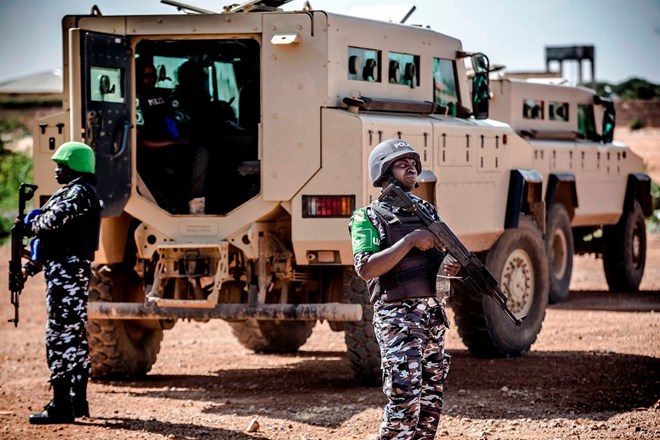
MOGADISHU — The United States has donated 24 armored personnel carriers to the African Union peacekeeping mission in Somalia, three months after the deadliest attack in years on the U.S.-backed peacekeeping mission.
The handover, attended by U.S. Ambassador to Somalia Larry Andrè and senior officials of the African Union Transition Mission in Somalia, ATMIS, took place Thursday in Somalia’s capital, Mogadishu.
The 24 armored personnel carriers (APCs), donated by the U.S. government will boost the A.U. forces’ capability to fight militant group al-Shabab.
The specialized vehicles will be used by the A.U. Djiboutian contingent in joint military operations with the Somali National Army (SNA) in and around Beledweyne — the capital of Somalia’s central region of Hiran.
Ambassador Andrè said the APCs will protect troops against roadside bombs.
“The expression of our support, amongst other ways, is the donation of these vehicles to help protect African Union forces–in this case Djibouti’s military contingent–as they travel the roads of Somalia which too often will be trapped by dangerous explosive devices put there to harm those who only seek to help Somalia,” he said.
A top African Union official, Fiona Lortan, said the military hardware had arrived at an opportune time as the mission is reconfiguring its troops and equipment.
“On behalf of the African Union, its membership, and all the ATMIS troop contributing countries, including Djibouti and all the others since ATMIS is a collective effort of solidarity and support to the Somalia people, I would like to thank the government and the people of the United States for the generosity and steadfastness in supporting our presence in Somalia,” said Lortan.
Al-Qaida affiliated al-Shabab has been fighting Somalia’s government and A.U. peacekeepers in Somalia for 15 years, seeking to install a strict Islamist state like the Taliban in Afghanistan.
In May, the group attacked an ATMIS base in Somalia’s Middle Shabelle region, using suicide bombers detonating three cars filled with explosives.
Islamist fighters then pounded the facility with heavy gunfire and rocket-propelled grenades, killing several dozen African Union peacekeepers from Burundi.
The military support by the U.S. comes as Somalia’s new president, Hassan Sheikh Mohamud, announced that he is determined to wage war against al-Shabab militarily, as well as on economic and ideological grounds.
The Somali military said it conducted an operation against al-Shabab in Somalia’s central Hiran region this week, killing 30 al-Shabab fighters.
In May, U.S. President Joe Biden authorized re-deployment of U.S. troops to Somalia to help fight the militants. Biden’s predecessor, Donald Trump, pulled around 700 American troops from the east African country during the final month of his presidency.
From al-Shabab to the cabinet: Somalia’s move fuels debate

Source: Aljazeera, Friday August 5, 2022
Mukhtar Robow, formerly a leader of the rebel group, has been appointed as a minister.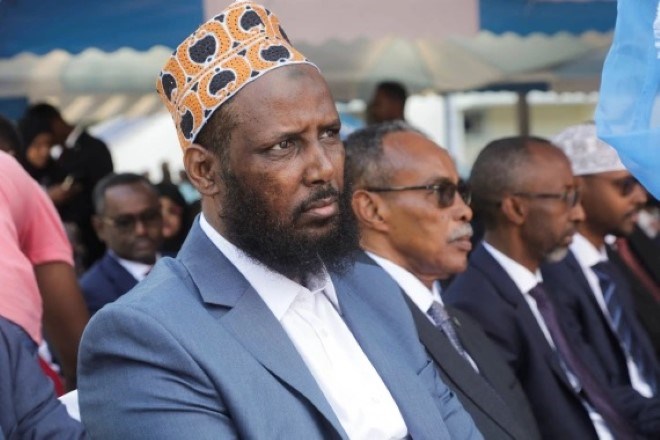
Former al-Shabab group co-founder and spokesperson Mukhtar Robow sits among colleagues after he was named the minister in charge of religion by Prime Minister Hamza Abdi Barre in Mogadishu, Somalia August 2, 2022 [Feisal Omar/Reuters]
Somalia’s appointment of a former al-Shabab leader to the cabinet is fuelling debate.
While some are critical of Hamza Abdi Barre’s administration for naming Mukhtar Robow as the minister in charge of religious affairs, others laud the move as a step towards reconciliation and smart way to battle against the group.
The once-feared man – an al-Shabab co-founder, its former spokesperson and deputy leader – had been in a hideout for years before surrendering to the government in August 2017. He split with al-Shabab in 2013.
After intense negotiations with the state, Robow was delisted from the US terror list and denounced al-Shabab publicly.
However, regardless of his dramatic U-turn, his journey from house arrest – which he had been under for the past three years – to high-ranking minister was far from expected.
Some analysts believe the appointment could play a significant role in the fight against al-Shabab, an al-Qaeda-linked group formed in 2007, which wants to overthrow Somalia’s internationally recognised government and impose strict Islamic law.
“I think the reason why he was brought from house arrest to the cabinet minister is to create and come up with a counter-narrative to that of al-Shabab since he deeply understands their philosophy and their tactics,” Zakaria Yusuf, a researcher on Somalia at the International Crisis Group, told Al Jazeera.
“He may also have influence within the militant [group] and could attract more fighters from the group [to the government’s way of thinking.]
“I believe he can successfully run this docket given his background and experience in endowment affairs.”
Hassan Sheikh Mohamud, Somalia’s president since May this year, has promised to fight al-Shabab militarily, financially and ideologically.
‘He understands al-Shabab’s tactics’
Robow, 52, once had a $5m United States reward on his head.
He is not the only high-ranking al-Shabab leader to have defected from the group, but remains the only one to have been handed a top ministerial role.
Abdirahman Turyare, the Somali government spy chief between 2014 and 2016, said Robow’s appointment signals the government’s commitment to battling the group.
“Given his involvement for years, I believe he understands al-Shabab’s tactics, strategies and how they operate their fight against the government. He also has a huge following in his native Bay and Bakool regions, where the group holds substantial amounts of territory,” said Turyare, who initiated talks with Robow in 2014. “He could easily convince them to defect from the group.
“His appointment will help the government not only militarily but also ideologically, and would encourage those within al-Shabab that they can defect to the government and can be welcomed, and even pardoned, if they denounce.”
In December 2018, Robow made it known he had political ambitions and wanted to vie for Somalia’s South-West State regional presidency.
Ultimately, however, he did not participate in the race and was put under house arrest.
According to Afyare Elmi, head of the Heritage Institute for Policy Studies, a think-tank in Mogadishu, Robow’s appointment signals what new governments want to do about al-Shabab “and encourages the militant leaders that they can negotiate with them”.
He told Al Jazeera by phone: “It also shows that they want to either fight or face them ideologically. There is a general idea that he can influence many sectors – maybe among those within al-Shabab who might be interested in joining the government.”
On concerns that the government’s embrace of a former al-Shabab leader symbolises impunity, Elmi said: “That is true, but we have to remember that there has never been accountability for all the people who were involved in the civil war, whether they’re warlords or past military leaders. So I think it’s not only for Robow, but there are many other individuals who are accused of crimes against humanity, and they are either in parliament or other levels of government.”
In a first, Somalia-based al-Shabab is attacking in Ethiopia
In a first, Somalia-based al-Shabab is attacking in Ethiopia

Source: AP, Friday August 5, 2022
By Omar Faruk
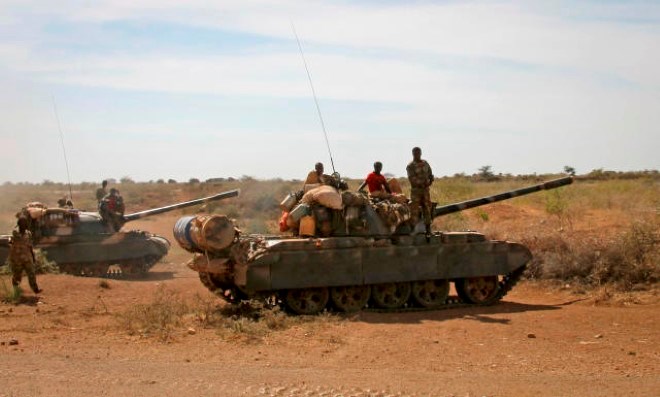
Ethiopian military tanks sit in position on the outskirts of the town of Baidoa in Somalia, Feb. 29, 2012. The al-Shabab extremist group has exploited Ethiopia’s internal turmoil to cross the border from neighboring Somalia in unprecedented attacks in July 2022 that a top U.S. military commander has warned could continue. (AP Photo, File)
MOGADISHU, Somalia (AP) — The al-Shabab extremist group has exploited Ethiopia’s internal turmoil to cross the border from neighboring Somalia in unprecedented attacks in recent weeks that a top U.S. military commander has warned could continue.
The deadly incursions into Ethiopia, Africa’s second most populous country and long seen as an anchor of security in the Horn of Africa, are the latest sign of how deeply the recent war in the northern Tigray region and other ethnic fighting have made the country more vulnerable.
Ethiopia has long resisted such cross-border attacks by the al-Qaida-linked al-Shabab, in part by deploying troops inside Somalia, where the extremist group controls large rural parts of the country’s southern and central regions. But the government of Prime Minister Abiy Ahmed and its security forces have struggled with unrest at home especially since the Tigray conflict began in late 2020.
Experts say al-Shabab, also emboldened by instability under Somalia’s previous administration, is seizing the chance to expand its footprint and claim the killing of scores of Ethiopian security forces. But the group is also feeling the pressure of a renewed push by Somalia’s new government and the return of U.S. forces to the country after their withdrawal by former President Donald Trump.
The turn to Ethiopia is a significant strategic shift by al-Shabab, Matt Bryden, a security analyst with the Sahan Foundation think tank, told The Associated Press. The extremist group had never been able to conduct major operations inside Ethiopia.
“The reports of clashes along the Ethiopia-Somalia border are just a fraction of the overall picture,” Bryden said. “We understand that planning for this offensive began more than one year ago, when the Ethiopian government appeared to be on the verge of collapse” as rival Tigray forces pushed toward the capital, Addis Ababa. Those forces later retreated, and both sides are edging toward peace talks.
Al-Shabab has trained several thousand fighters for its Ethiopian “command,” mainly ethnic Somalis and Oromos inside Ethiopia, Bryden asserted. Ethiopia’s federal government has said it fears al-Shabab will link up with the Oromo Liberation Army, which it has designated a terror organization, though other security experts have called that unlikely.
Hundreds of al-Shabab fighters were able to slip into Ethiopia last week alone and their presence has been detected near multiple communities such as El Kari, Jaraati, and Imey, Bryden said. The incursions began in late July.
“There are also credible reports of al-Shabab units deploying in the direction of Moyale,” the main border post between Ethiopia and Kenya, he said.
Somalia’s previous president, Mohamed Abdullahi Mohamed, avoided any major confrontation with al-Shabab. But new President Hassan Sheikh Mohamud has said his government will take the offensive against the group’s thousands of fighters, with the backing of returning U.S. forces.
“Al-Shabab therefore faces a much greater military challenge in Somalia than before and has therefore embarked on this Ethiopian campaign in order to preserve some of its forces and establish strategic depth,” Bryden said.
He warned that if al-Shabab establishes a stronghold in southeastern Ethiopia, “the consequences for peace and security in the region could be very serious indeed.” The fighters would be well-positioned to strike deeper into Ethiopia, into Kenya and even as far as Uganda to the west. Al-Shabab has carried out several high-profile deadly attacks inside Kenya over the years.
The outgoing head of the U.S. Africa Command, Gen. Stephen Townsend, last month warned that al-Shabab’s activities inside Ethiopia were not a “one-off” and said the fighters made it as far as 150 kilometers into the country.
Al-Shabab has long regarded Ethiopia an enemy for its long military presence inside Somalia countering the fighters. Via its Radio Andalus media arm, the extremist group has claimed killing at least 187 Ethiopian regional forces and seizing military equipment in its attacks.
Ethiopian officials have expressed alarm. On Tuesday, the country’s Somali regional president, Mustefa Omer, told a regional assembly that more than 600 al-Shabab fighters have been killed.
The region is in a lengthy war with the extremists, not just a one-time clash, he said, and “the Ethiopian federal army is currently involved in the fight against the terrorists … and we will also work with Somalia.”
He said the goal is to create a security buffer inside Somalia to guard against further incursions. “We should not wait for the enemy to invade,” he said.
Also on Tuesday, the Somali region announced that Ethiopian military officials had arrived in Somalia’s town of Beledweyne to discuss strategies to counter al-Shabab’s incursion. The statement said Ethiopia’s soldiers in the African Union peacekeeping force in Somalia will be deployed against the extremists.
Residents of the Somali town of Yeed near the Ethiopian border told the AP they witnessed losses suffered by al-Shabab fighters in an Ethiopian attack last week. They spoke on condition of anonymity out of fear of retribution.
And a resident of Somalia’s Bakool region, Isak Yarow, said Ethiopian military planes have carried out airstrikes in Garasweyne village in an area where Ethiopian and al-Shabab fighters have clashed.
Ethiopia’s military has claimed the killing of three prominent al-Shabab figures including its propaganda chief, but the extremist group has denied it.
While Al-Shabab’s ultimate aims inside Ethiopia are yet to be determined, its new actions signal its “growing ambition, regional capabilities, and opportunism to exploit regional geopolitics, especially as the Abiy Ahmed government struggles to contain the various insurgencies inside Ethiopia,” security analysts Caleb Weiss and Ryan O’Farrell wrote late last month.
Security analyst Ismail Osman, a former deputy of Somalia’s National Intelligence and Security Agency, told the AP that “President Hassan Sheikh Mohamud’s immediate priority is to eradicate al-Shabab” and warned that regional tensions could worsen amid this new instability.
___
An Associated Press writer reported from Nairobi, Kenya.
UN provides 9.5 mln USD for famine prevention in Somalia
UN provides 9.5 mln USD for famine prevention in Somalia

Source: Xinhuanet, Thursday August 4, 2022
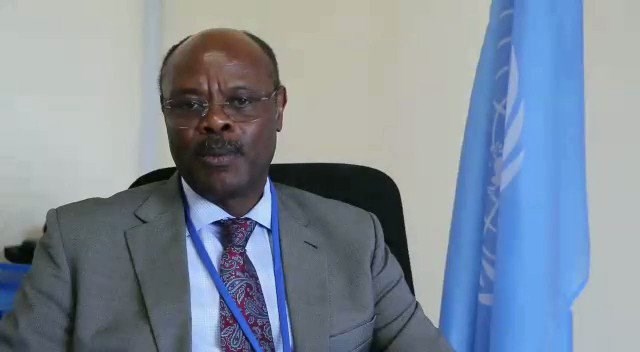
The United Nations humanitarian agency has provided 9.5 million U.S. dollars to provide immediate assistance to communities in areas at the highest risk of famine in Somalia.
Adam Abdelmoula, the deputy special representative of the Secretary-General and also UN Resident and Humanitarian Coordinator for Somalia, said the new allocation from the Somalia Humanitarian Fund (SHF) will be crucial in ramping up life-saving responses to the needs of worst-affected communities in the Bay and Bakool regions in the South West State of Somalia.
Abdelmoula said in a statement released in Mogadishu, the capital of Somalia, Wednesday that the risk of famine and the number of people getting displaced has alarmingly increased.
“Somalia is on the brink of a humanitarian catastrophe, yet the funding needed to respond to rapidly growing needs remains vastly insufficient to avert the worst outcomes,” he said.
According to the UN, the risk of famine in Somalia has intensified following a historic fourth failed rainy season, and now catastrophic hunger looms. It said the escalating drought conditions have affected more than 7 million people and displaced over 900,000 more people from their homes in search of water, food, and pasture, with the majority being women and children.
According to the UN, hunger is rising with about 45 percent of the population being classified as acutely food insecure, while 213,000 others are facing catastrophic food insecurity.
“We are racing against the clock to reach the most vulnerable and to prevent the loss of lives and livelihoods. I urge everyone to step up our collective efforts to help the people of Somalia,” Abdelmoula said.
The UN agency said the risk of famine is the highest in the Bay and Bakool regions and particularly in the Bay where for the first time since 2017, the Integrated Food Security Phase Classification has confirmed pockets of catastrophic food insecurity.
It said the allocation will promote an integrated response to prevent the worst outcomes through cash for food, emergency livelihood inputs, provision of essential health, nutrition, and water as well as sanitation services.
The SHF is a multi-donor country-based pooled mechanism that allocates funding for the most urgent life-saving.
Humanity’s just one misunderstanding away from ‘nuclear annihilation’ warns UN chief
Humanity’s just one misunderstanding away from ‘nuclear annihilation’ warns UN chief
Source: UN, 1 August 2022 Global
As geopolitical tensions reach new highs, and some governments are spending billions on nuclear weapons in a false bid for peace and security, countries must uphold the nearly 80-year norm against their use, UN Secretary-General Antonio Guterres said in New York on Monday.
Upcoming Documentary about Ethiopian Emperor Haile Selassie
Upcoming Documentary about Ethiopian Emperor Haile Selassie
Source: CBS did a brief interview titled “Grandpa Was an Emperor” with Yeshi Kassa, granddaughter of Ethiopian Emperor Haile Selassie and now a New York banker, concerning an upcoming documentary about Haile Selassie. The details of the documentary are still being worked out, but based on this interview it sounds like it will be worth the wait.
Labels: Emperor Haile Selassie, Ethiopia, history
US Envoy Visits Ethiopia
US Envoy Visits Ethiopia
Source: Agence France Presse published on 31 July 2022 an article titled “US Envoy Urges Progress on Ethiopia Peace Talks, Aid.”
US Special Envoy for the Horn of Africa recently visited Ethiopia where he urged the central government and Tigrayans to move forward with the peace process. He also discussed the Grand Ethiopian Renaissance Dam with Ethiopian Deputy Prime Minister Demeke Mekonnen.
Labels: Abiy Ahmed, aid, AU, Debretsion Gebremichael, Demeke Mekonnen, Egypt, Ethiopia, food insecurity, GERD, Mike Hammer, peace process, Sudan, Tigray Region, TPLF, US
Africa lays out goals ahead of UN climate summit 27
Africa lays out goals ahead of UN climate summit 27

Source: Hiiraan, Wednesday August 3, 2022
By WANJOHI KABUKURU
African officials outlined their priorities for the upcoming U.N. climate summit, including a push to make heavily polluting rich nations compensate poor countries for the environmental damage done to them
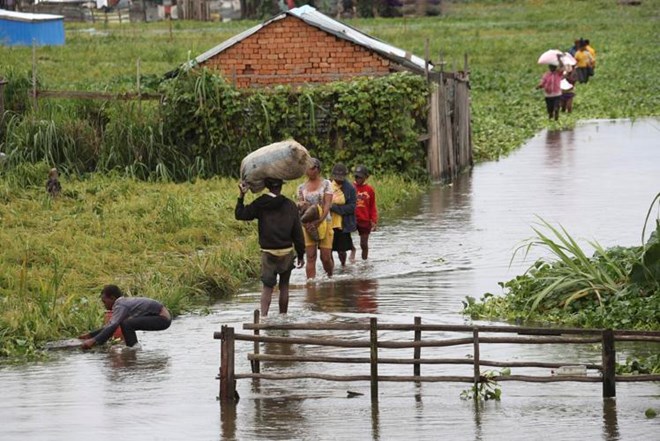
FILE – Residents wade through flood water around their homes after heavy rain in Antananarivo, Madagascar, Jan. 19, 2022. Alexander Joe/ AP
MOMBASA, Kenya (AP) — African officials outlined their priorities for the upcoming U.N. climate summit, including a push to make heavily polluting rich nations compensate poor countries for the environmental damage done to them.
The continent will also focus on how countries can adapt to global warming and how the continent can best halt further climate-related disasters. Africa has seen debilitating droughts in the east and Horn of Africa and deadly cyclones in the south.
Other key areas for discussion include moving from high-carbon energy sources like oil and gas to renewables, and “carbon credit” schemes, where foreign governments and companies pay for tree planting in exchange for producing greenhouse gases.
advertisementsThe U.N. climate conference, known as COP27, will be held in Egypt in November.
How much funding Africa gets is the biggest factor for how prepared it will be for a hotter future, said Harsen Nyambe, the director of sustainable environment at the African Union Commission.
“We recall the $100 billion that was promised has never been fulfilled and current assessments show that even that amount is not enough,” Nyambe said, referring to a 12-year-old pledge by rich nations to provide climate funding for poorer nations.
“Africa must be given adequate time to transition and transform its energy infrastructure. We cannot transform abruptly. We need resources, capacity, technology transfer and finance to power our development,” he added.
A commitment made in the previous international summit in Glasgow to spend half of climate funds on helping developing nations adapt to the effects of a warming world by having infrastructure and agriculture that’s resilient to more volatile weather systems, must be followed through, said Jean-Paul Adam, director of climate change for the U.N.’s Economic Commission for Africa.
He added the continent only received about 7.5% of its promised $70 billion in climate funding between 2014 and 2018.
Africa needs around $3 trillion to fulfill its self-determined emissions targets, known as nationally determined contributions, that each country is required to submit as part of the 2015 Paris agreement on climate, according to U.N. and Africa Development Bank estimates.
More meetings between the continent’s climate leaders are set to follow ahead of COP27.
Massive US Humanitarian Aid to Ethiopia and Somalia
Massive US Humanitarian Aid to Ethiopia and Somalia
Source:, The National Interest published on 28 July 2022 an article titled “USAID Rushes Aid to Drought-Stricken Horn of Africa” by Trevor Filseth.
USAID announced it is sending $488 million in humanitarian aid to Ethiopia to respond to the country’s four-year drought that is impacting 7.4 million people. This announcement follows a similar $476 million humanitarian aid package for Somalia. Russia’s invasion of Ukraine has exacerbated the food deficit situation in the Horn of Africa.
Labels: drought, Ethiopia, food insecurity, Horn of Africa, Russia, Somalia, Ukraine, US, USAID
Kenya exports Sh220 million ($1.86 million) worth of miraa to Somalia in four days
Kenya exports Sh220 million ($1.86 million) worth of miraa to Somalia in four days
l
Source: Nation, By Gerald Andae
Monday August 1, 2022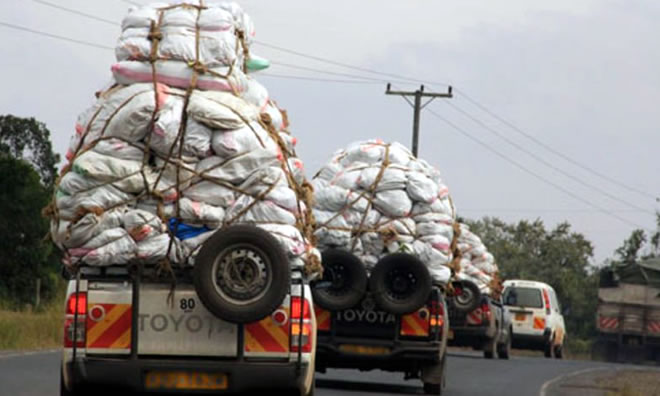
PHOTO | FILE Vans transporting miraa from Meru to Nairobi. Farmers in the region say a ban on sale of the crop will affect their livelihoods.
Kenya exported miraa (khat) worth Sh221 million ($1.86 million) in four days since the resumption of the Somalia market, highlighting the significant role that the commodity is playing in the economy.
Head of Miraa Pyrethrum and other Industrial Crops Felix Mutwiri said the country has exported 81.4 tonnes of the stimulant to Mogadishu since the market opened up last weekend.
Mr Mutwiri said 19 traders out of the 22 that had applied for export permits had been cleared even as more traders have sought clearance to get the licences.
“We have so far exported 81.4 tonnes in the last four days and we expect the volumes to grow in the next coming days as more people are cleared to ship out the commodity,” said Mr Mutwiri.
The directorate started issuing export licences to miraa traders last week after they were cleared under the new regulations.
advertisementsAnyone who exports miraa without registration and a licence is liable for a sentence of up to three years or a fine of up to Sh5 million.
A kilo of miraa to Somalia is now going for $23 (Sh2,734), which is still lower when compared with the $25 (Sh2,972) that it fetched before the market was stopped.
Kenya is facing competition at the market from Ethiopia which has been supplying the market with miraa after Nairobi was locked out.
Nyambene Miraa Trade Association (Nyamita) chairman Kimathi Munjuri said there is enough crop in the farms to meet the market.
“We have a lot of miraa right now in the farmers and we can meet the market demand in Somalia,” said Mr Munjuri.
Traders have been relying on local market in the last three years after Khartoum banned export of the stimulant following a diplomatic row between the two countries.
The move saw Kenya embark on scouting for a new market in Djibouti to save farmers who rely on the crop as their main economic mainstay.
Djibouti is getting most of its khat supply from Ethiopia, however, there is a huge deficit for the stimulant as Addis Ababa is unable to meet the country’s total demand.
The directorate said that even with the resumption of the Somalia market exports, they are still targeting European countries, which in 2014 banned the crop after it was classified as a drug.
gandae@ke.nationmedia.com
Somalia gets $470M from US as ‘ravaging drought’ wreaks havoc
Somalia gets $470M from US as ‘ravaging drought’ wreaks havoc

Source: AA, Magdalene Mukami
Monday July 25, 2022
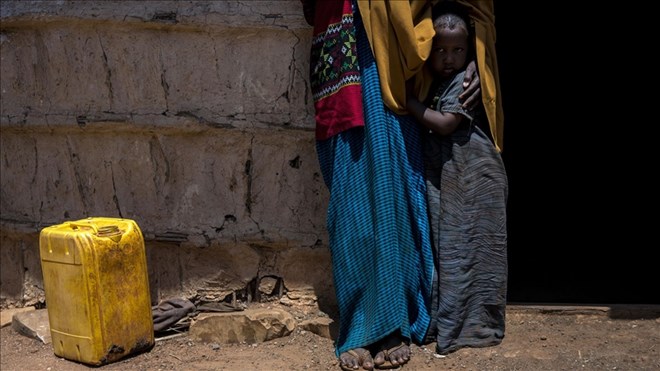
Somalia will receive $470 million from the United States Agency for International Development (USAID) to help in efforts to address the ongoing humanitarian crisis in the drought-stricken country.
The commitment was made by USAID chief Samantha Powers during a meeting with President Hassan Sheikh Mohamud in Somalia on Sunday.
advertisementsDuring their discussions, Mohamud emphasized his government’s determination to tackle the “ongoing humanitarian and drought crisis, intensify the fight against terrorist groups and prioritize political stability, democratization and reconciliation,” according to Somali National Television.
Powers “promised $470 million to support aid and development projects,” the report said.
Abdirahman Abdishakur, Somalia’s special presidential envoy for drought response, welcomed the new US funding.
It “comes at a time of unprecedented suffering in our country due to the ravaging drought,” he said on Twitter, adding that USAID remains Somalia’s “largest humanitarian donor.”
According to UNICEF estimates, 7.1 million Somalis, or half the population, will face severe food insecurity by the end of 2022.
Some 1.5 million children in Somalia under five years of age will be severely malnourished, its latest situation report said, a figure that amounts to around 45% of all kids in Somalia.
Powers is visiting countries in East Africa where an “unprecedented drought is pushing millions to the brink of starvation and food insecurity is being further exacerbated by Russia’s invasion of Ukraine,” according to a USAID statement.
During her stop in Kenya, she announced “nearly $255 million in additional emergency food and other critical humanitarian and development assistance.”
In Kenya, the “historically unprecedented” drought has pushed more than 4 million people to the edge of starvation, said a USAID statement earlier this week.
President Biden to Host Africa Summit in December
President Biden to Host Africa Summit in December
Source: The White House issued a statement on 20 July 2022 that President Biden will host in Washington on 13-15 December the US-Africa Leaders Summit. The last one took place in 2014.
Labels: Africa, Biden administration, climate change, COVID-19, diaspora, health, peace, security, US-Africa Leaders’ Summit
Amnesty urges probe into Ethiopia mass killings

Kalkidan Yibeltal
Source: BBC, Thursday July 21, 2022
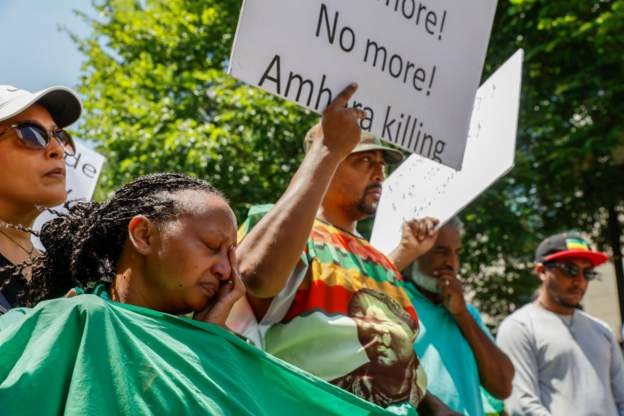
There have been protests against the mass killings in Ethiopia
Rights watchdog Amnesty International has called on Ethiopian authorities to launch an “impartial” investigation into last month’s killing of more than 400 ethnic minorities in the country’s Oromia region.
The killings showed the attackers’ “utter disregard for human life”, a new report by the organisation released on Thursday says.
The violence in Tole area of Gimbi district saw farming villages populated by minority ethnic Amharas targeted.
advertisementsIt has been blamed on the armed group the Oromo Liberation Army (OLA), but authorities have also been criticised for failing to respond fast enough to the violence.
Government forces arrived hours after the attackers had left despite being told about the attack much earlier, according to witnesses cited in the report.
The OLA has denied carrying out the attacks, which it said was the work of a militia group set up by the government.
Amnesty called the Tole killings “a callous massacre” and it was followed – two weeks later – by similar attacks in a different district in the region.
Officials vowed to take measures in the wake of the two attacks and promised to conduct investigations.
But there are already some who have raised questions on the independence of a government-led probe.
The street cleaners of Mogadishu: Doing Somalia’s riskiest job
The street cleaners of Mogadishu: Doing Somalia’s riskiest job

Source: Aljazeera, By Hamza Mohamed
Thursday July 21, 2022
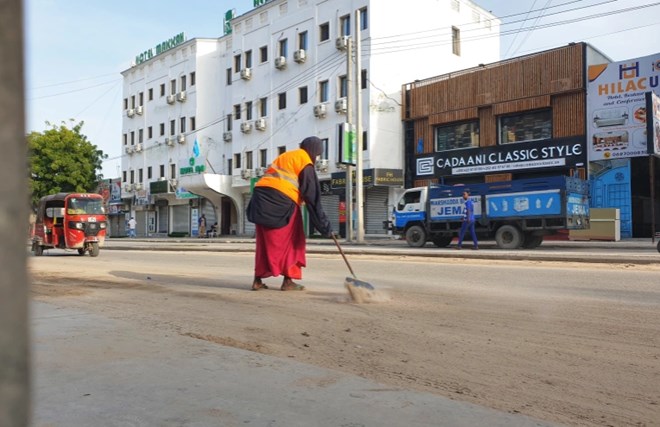
At night or early morning, female street cleaners say they do not like to wear high visibility jackets as that can attract robbers [Hamza Mohamed/Al Jazeera]
Mogadishu, Somalia – It is an hour before sunrise in downtown Mogadishu. The Somali capital is fast asleep with eerie silence hanging in the warm salty air blowing from the Indian Ocean.
Apart from a small group of women wearing dark-coloured clothes and flip-flops on Maka al-Mukarama road in the heart of the city, there is no other soul in sight. With few street lights working, the women blend almost perfectly into the pre-dawn darkness.
Each is carrying a plastic broom, a shovel and sack, and works about 300m (984 feet) away from the other. They barely make any sound as they get to work.advertisements“It is best not to be seen for your own safety,” one of them, 50-year-old Maryan Salad Mohamed, told Al Jazeera. “We do our best not to be seen and even better if no one hears us. There are many dangers when you do our job.”
Maryan and the others are street cleaners working for the city’s local authority – one of the most dangerous jobs in the Somali capital.
“Before I leave the house I pray. You don’t know if you will come back alive,” the mother-of-seven, told Al Jazeera in a low, soft voice.
There is no official count for the number of street cleaners who have lost their lives in the line of duty. But for years, the city has lost dozens of street cleaners due to Improvised Explosive Devices (IEDs) hidden in rubbish left on the side of the streets.
In August 2008, at least 21 female street cleaners were killed on the same stretch of the street following an explosion that also left 46 others, mostly women street cleaners, wounded. In August 2014, an explosion left four female street cleaners dead and seven others injured in that same district of Mogadishu.
And in a gruesome attack in February 2019, unknown gunmen shot dead nine street cleaners, including six women at a location some 15km (9 miles) from the city centre.
Authorities blamed the al-Qaeda-linked armed group al-Shabab for the deadly blasts.
The group, which wants to impose a strict interpretation of Sharia law in Somalia, is fighting the country’s Western-backed government. It has often planted IEDs on the side of the roads to take down passing government officials or African Union peacekeeping troops in the country.
But it has denied government claims they are behind the attacks or that street cleaners are the goal.
“We do not target anyone for cleaning the streets of Mogadishu, in fact cleaning the streets is an act of charity that is welcomed by Islam,” the group told Al Jazeera in a statement on July 5.
“Mogadishu’s street cleaners are killed by the same troops who frequently target the Tuk-tuk drivers of Mogadishu, and everyone knows who those are. They are the apostate militia and their foreign crusaders,” the statement added.
‘No other option’
Most of them are widows who lost their husbands during the country’s 30-year-old civil war and are their families’ breadwinners. On any given day, there are at least 450 of them cleaning the streets of the Somali capital, according to the local city authority.
The highest earners take home $150 a month. Some receive food rations in exchange for the work and many work on a voluntary basis hoping to secure a job if and when one comes up.
A short distance away, Hawo Ali Hassan, an eight-year veteran of the streets is going through empty boxes left on the side of the road gently with two fingers.
Hawa says she doesn’t like her “very risky” job but has to do it to put food on the table for her large family.
“I would not recommend anyone to do it. You can die at any moment. I work seven days a week because I have to support my children and blind husband,” the mother of 10 children said.
Her husband became blind after a mortar landed near where he was working 10 years ago.
“I have no other option. I’m a mother. I will do anything to support my children. Yes, it is risky but I will take any risk for them,” the 58-year-old added as she moved to the next pile of rubbish that needed clearing.
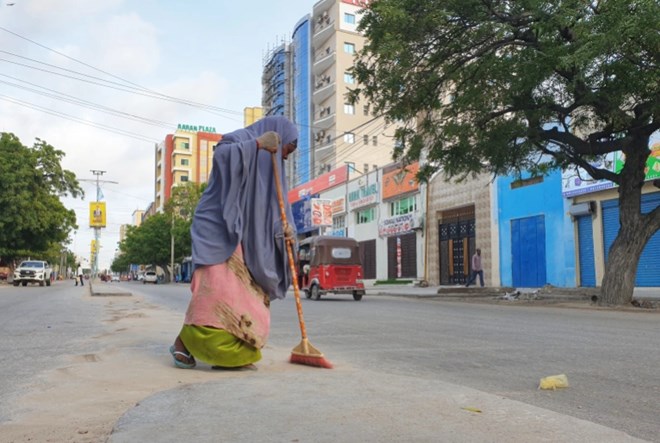
Most of the female street cleaners are their families’ sole breadwinners [Hamza Mohamed/Al Jazeera]
Relatives of the street cleaners lost in the line of duty are still coming to terms with the tragedy.
“I still remember receiving a phone call from my brother-in-law telling me my grandmother has been killed,” Hodma Abdishakur Hassan told Al Jazeera.
“She was blown up near Medina police station. She was just starting her shift. Her lower body was blown to pieces. She was alive first but died of the injuries a few hours later. She was not just my grandmother but was also raising me and my two other siblings,” Hodma added, tears dripping on her black niqab.
Fay Mohamed Hassan was 70 years old when she was killed in November 2011 and earning $120 a month, Hodma added. Two other female cleaners lost their lives in the same explosion.
Easy targets
IEDs are not the only threat the street cleaners face on a daily basis.
“We are easy target for robbers. Most of us have [been] robbed of mobile phones and valuables. If you work late at night or early morning then you will most likely get robbed. And they are very violent. It is why none of us want to wear high viz jackets because it will attract robbers,” Maryan said.
The local authority says they are doing their best to protect their staff.
“We have stopped them from working night shift for safety reasons,” Hussein Abtidoon Warsame, the deputy head of sanitation for Mogadishu municipality told Al Jazeera.
“We have started hiring male staff to deter thieves from targeting female staff. But it is not easy to find male staff because men don’t want to do cleaning work,” he added.
Hussein, who himself was badly injured in an attack claimed by al-Shabab and moves with the help of a walking stick, says government pays the hospital bills of those injured in the line of work.
“Sadly, we can’t afford to give compensation if someone dies. We don’t have the money. But we will give the position to family members if they wish [to] take up the work,” he added.
For the women going out every morning to keep Mogadishu clean, it is a risk they are long accustomed to.
“We have no one to protect us but God. In our line of work, we fear people. Not stray dogs or wild animals,” Maryan said.
Somalia calls on A.U. to support its campaign to lift the arms embargo imposed on it by U.N. Security Council
Somalia calls on A.U. to support its campaign to lift the arms embargo imposed on it by U.N. Security Council

Source: Hiiraan Online, Sunday July 17, 2022
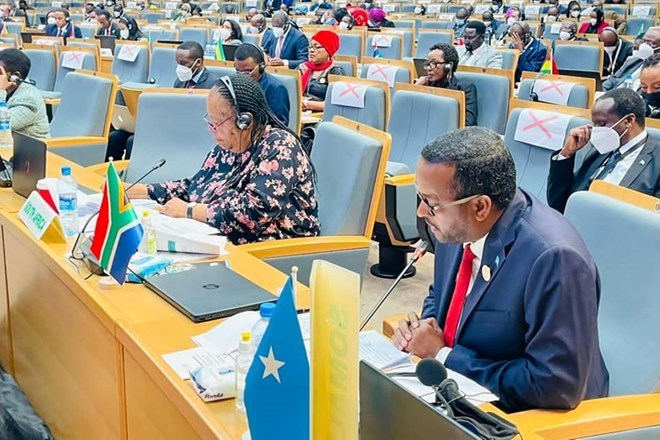
Mogadishu (HOL) – The Acting Foreign Minister and State Minister for Foreign Affairs and International Cooperation, Balal Mohamed Osman, participated in the 41st Ordinary Session of the Executive Council of the African Union held from 14-15 July in the Zambian capital, Lusaka.
The foreign ministers of African Union member states discussed challenges facing the continent. They reported on the implementation of the transition plan, including the quota system, audit skills, the emergency recruitment plan, and the mid-term implementation report of the 2022 African Union theme on nutrition.
advertisementsThey also discussed the issue of lifting the arms embargo imposed on Somalia by the U.N. Security Council on January 23, 1992, and the full implementation of the Security Transitional plan (STP) in line with U.N. Security Council Resolution No. 2628
The Somali government wants to fully assume its security responsibility from the African Union Transition Mission in Somalia (ATMIS). It was also agreed to stand firmly by Somalia in its campaign to lift it from the UNSC embargo so that it could arm its armed forces to maintain its security and confront terrorism and all destabilizing activities.
On the sidelines of the meeting, the Somali Acting Minister of Foreign Affairs held separate meetings with the Foreign Ministers of Ethiopia, Demeke Mekonnen, South Africa, Ms. Naledi Pandor, Algeria, Ramtane Lamamra, Tunisia, Othman Jerandi, Tanzania, Amb. Liberata Mulamula, Gambia, Mamadou Tangara, and Ghanaian Deputy Foreign Minister for Political and Economic Affairs, Hon. Kwaku Ampratwum-Sarpong, as well as other heads of delegations, discussed with them ways to enhance bilateral relations and cooperation in various fields of mutual benefit and joint coordination.
This year’s theme of the session was “Building resilience in nutrition on the African continent: Accelerate the Human Capital, Social and Economic Development.”
Djibouti President gives Medal of Honor to Somali President
Djibouti President gives Medal of Honor to Somali President

Source: Hiiraan, Sunday July 17, 2022
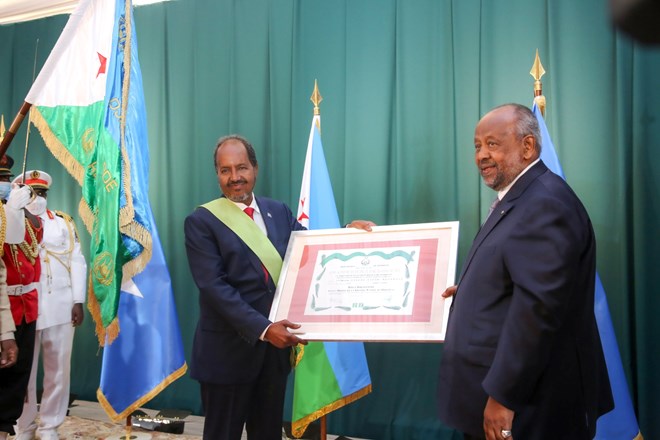
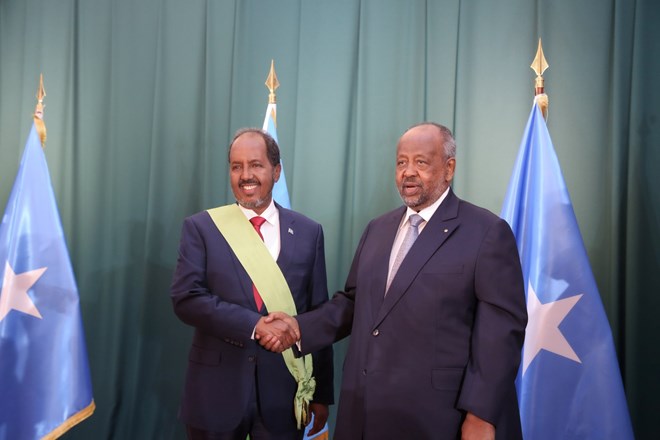
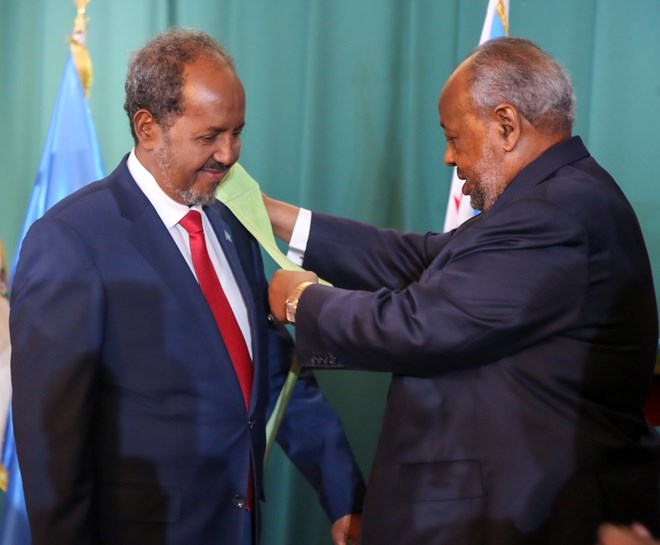
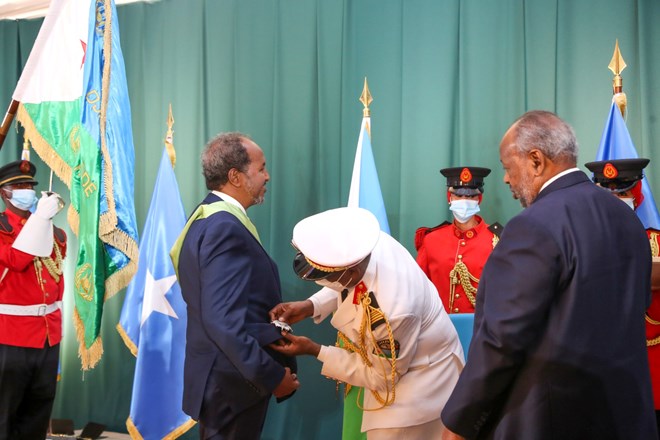

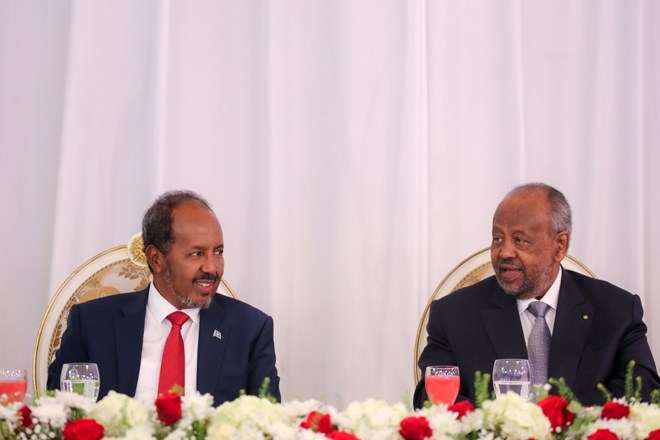
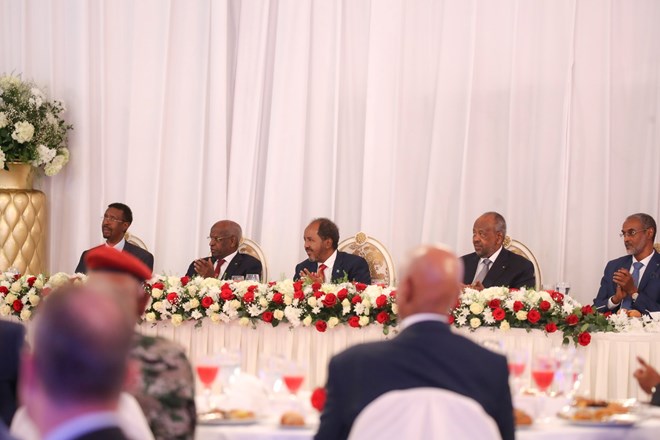
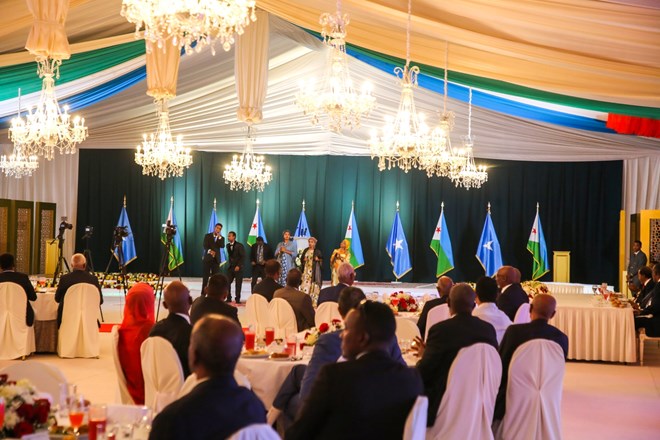

Mogadishu (HOL) – Somali President and his delegation were invited to a banquet at the Presidential Palace in Djibouti on Saturday night by Djibouti President Ismail Omar Guelleh.
According to a statement from Villa Somalia, President Guelleh awarded his counterpart Mohamud the highest Medal of Honor conferred by the government of Djibouti for his contribution to enhancing the bilateral ties between the two countries.
advertisementsPresident Hassan Sheikh Mohamud expressed his gratitude to the Djiboutian government and people for the Medal of Honor and the high-level reception they gave him. He also said that his visit marked the beginning of enhancing ties between Somalia and Djibouti.
During his stay in Djibouti, the President will deliver a speech in the Djibouti Parliament house on the situation in Somalia and the significance of the bilateral relationship between the two countries.
Since Mohamud was elected President on May 15, he has travelled abroad five times.
EU provides €450,000 of humanitarian funding to fight against measles in Somalia
EU provides €450,000 of humanitarian funding to fight against measles in Somalia
Devdiscourse
Saturday July 16, 2022
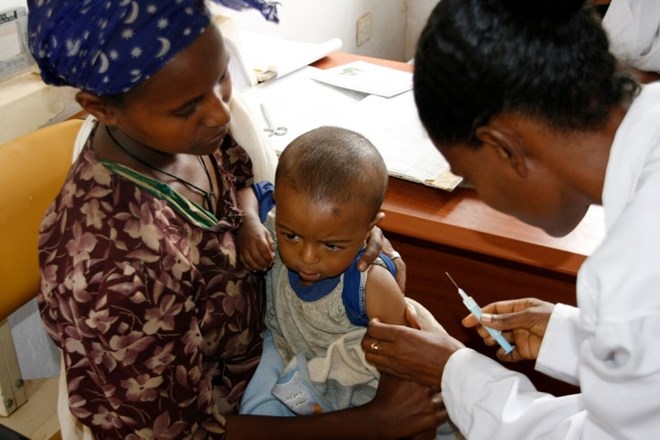
ECHO’s partner, the World Health Organisation, will also support this effort by providing the necessary material to reinforce lab and surveillance capacities. Image Credit: Flickr
The European Union is committing an additional €450,000 of humanitarian funding to support the fight against life-threatening measles outbreaks in Somalia. With measles cases on the rise in 2021-2022, this funding will support the EU-funded CAAFIMAD consortium led by Action Against Hunger (ACF) in contributing to the reduction of morbidity and mortality from measles.
CAAFIMAD partners will work through a combination of district-wide mass vaccination for children under 15 years old, medical management of complicated cases, vitamin A supplementation of children under 5 years old, and screening for malnutrition followed by appropriate management. This intervention builds on efforts undertaken this year in support of measles vaccination in Somalia, under the steer of the Ministry of Health, together with other humanitarian health partners.advertisementsCurrently, vaccination coverage among displaced children under 15 years of age is extremely low as displaced households come from hard-to-reach areas with limited to no previous humanitarian assistance, including basic health services.
This intervention will scale up outbreak control efforts in the most-affected districts of Galkacyo South, Baidoa, Afgoye and Bardhere in south-central Somalia.
“Today, hundreds of thousands of Somalis, most critically women and children, face famine. Thousands will die preventable deaths in the absence of interventions such as this expanded measles vaccination and treatment effort. Severely malnourished children are nine times more likely to die of measles and other preventable diseases – –immediate availability of treatment is therefore of highest importance,” said Javier Rio Navarro, Head of the EU Humanitarian Aid Office in Somalia.
ECHO’s partner, the World Health Organisation, will also support this effort by providing the necessary material to reinforce lab and surveillance capacities. UNICEF continues to support measles vaccination and other critical vaccination campaigns in Somalia by providing vaccines through the Global Vaccine Alliance, GAVI. (With Inputs from APO)
